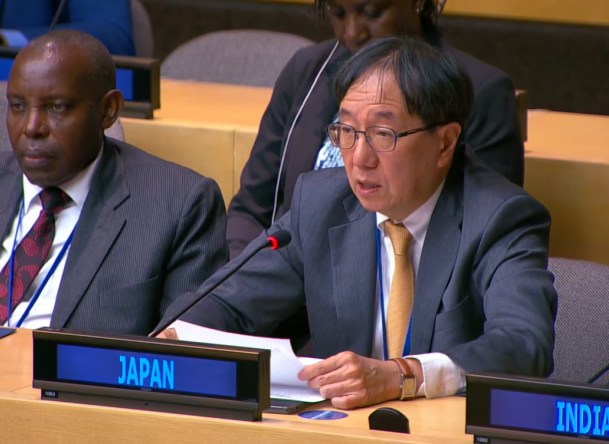Statement by H.E. Ambassador YAMAZAKI Kazuyuki, Permanent Representative of Japan to the United Nations, at the United Nations Peacebuilding Commission – Annual Session : Commemorative Ambassadorial-Level Meeting on Lessons from Peacebuilding Success Stories
2025/6/19

(As delivered)
Thank you, Chair.
I also express my gratitude to all the distinguished speakers and briefers for their valuable inputs.
As we celebrate the 20th anniversary of the Peacebuilding Architecture, Japan recognizes its indispensable function for peacebuilding and sustaining peace in the United Nations. Having uninterruptedly served on the PBC since its inception in 2005, Japan is confident that the PBC has established its vital advisory, bridging, and convening role, and believes in its future potential.
Today, I highlight three points for strengthening the PBC towards the future.
First is the need for the PBC’s further collaboration with the main UN organs and agencies to realize a whole-of-UN approach. Last September, Japan convened an Informal Consultation on strengthening the relationship between the PBC and the Security Council. We hope that its findings prove a constructive input for the Commission and the PBAR. This year, Japan aims to contribute through our role as the informal coordinator between the PBC and the General Assembly. Deepened collaboration between the PBC and UN development agencies is also essential to ensure the HDP nexus.
Second, utilization of the PBC in a wider geographical scope should be explored. In the Asia-Pacific Region, we are grateful for Timor-Leste having started to brief at the PBC in 2022 and for their sustained engagement. Japan acknowledges the countless good examples in the Asia-Pacific and encourages more countries in the region to share their experiences. As the PBC Vice Chair, we are also pursuing the possibility of cooperation with the Asian Development Bank as part of our effort to reinforce the collaboration with IFIs.
Finally, greater priority must be placed on supporting nationally- led conflict prevention efforts. Recalling the Security Council Open Debate Japan convened last year, 67 countries joined the press stakeout to emphasize the importance of promoting conflict prevention. To this end, we have supported initiatives in various countries including Sri Lanka, Mozambique, and the Central African Republic. Moreover, we welcome the growing inclination of countries to brief at the Commission on their National Prevention Strategies and stress the imperative for the PBAR to mainstream conflict prevention, which is always cost-effective and should warrant more attention and resources especially in the timing of the UN80 reform.
To conclude, we reassure Japan’s sustained and proactive commitment to the PBC.
I thank you.
I also express my gratitude to all the distinguished speakers and briefers for their valuable inputs.
As we celebrate the 20th anniversary of the Peacebuilding Architecture, Japan recognizes its indispensable function for peacebuilding and sustaining peace in the United Nations. Having uninterruptedly served on the PBC since its inception in 2005, Japan is confident that the PBC has established its vital advisory, bridging, and convening role, and believes in its future potential.
Today, I highlight three points for strengthening the PBC towards the future.
First is the need for the PBC’s further collaboration with the main UN organs and agencies to realize a whole-of-UN approach. Last September, Japan convened an Informal Consultation on strengthening the relationship between the PBC and the Security Council. We hope that its findings prove a constructive input for the Commission and the PBAR. This year, Japan aims to contribute through our role as the informal coordinator between the PBC and the General Assembly. Deepened collaboration between the PBC and UN development agencies is also essential to ensure the HDP nexus.
Second, utilization of the PBC in a wider geographical scope should be explored. In the Asia-Pacific Region, we are grateful for Timor-Leste having started to brief at the PBC in 2022 and for their sustained engagement. Japan acknowledges the countless good examples in the Asia-Pacific and encourages more countries in the region to share their experiences. As the PBC Vice Chair, we are also pursuing the possibility of cooperation with the Asian Development Bank as part of our effort to reinforce the collaboration with IFIs.
Finally, greater priority must be placed on supporting nationally- led conflict prevention efforts. Recalling the Security Council Open Debate Japan convened last year, 67 countries joined the press stakeout to emphasize the importance of promoting conflict prevention. To this end, we have supported initiatives in various countries including Sri Lanka, Mozambique, and the Central African Republic. Moreover, we welcome the growing inclination of countries to brief at the Commission on their National Prevention Strategies and stress the imperative for the PBAR to mainstream conflict prevention, which is always cost-effective and should warrant more attention and resources especially in the timing of the UN80 reform.
To conclude, we reassure Japan’s sustained and proactive commitment to the PBC.
I thank you.
